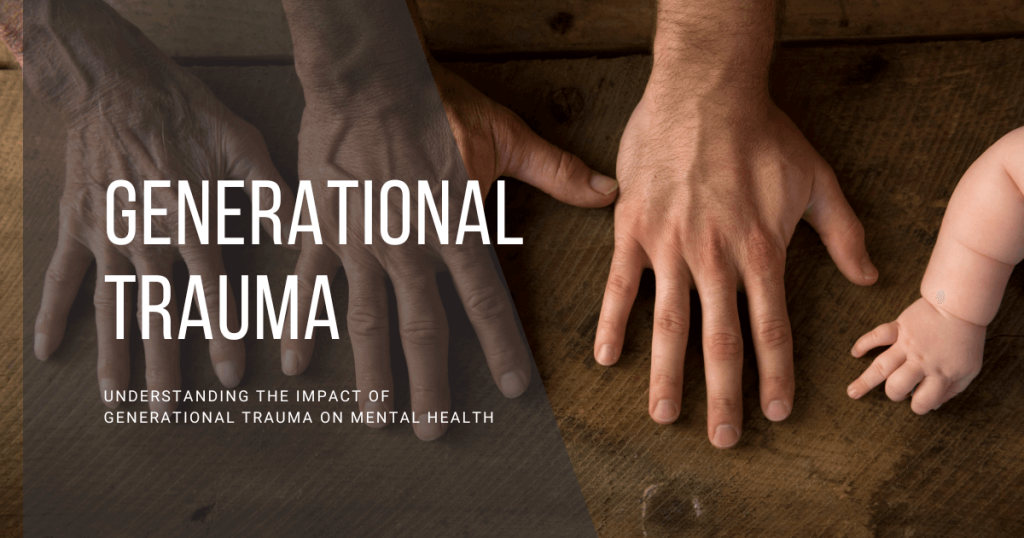Understanding the Impact of Generational Trauma on Mental Health
If you’ve been following my healing journey, you know it started with my getting a better understanding of the role that generational trauma has had on my life. Understanding the strengths that have been passed down and becoming aware of the harmful effects of this trauma have provided me with a much clearer picture of areas I need to heal.
Our human experience is made up of a collection of memories and cultural imprints, passed from one generation to the next. Sometimes, however, these legacies include echoes of trauma — a whisper of wars fought long ago, the chaos of a cultural upheaval, or the more personal struggles of our ancestors.
This idea of generational trauma, which has sparked the interest of the psychology community and is now being discussed more widely, refers to the build-up of scars passed down through generations.
In this post, we’ll dig into the powerful impact of generational trauma on our mental health today. We’ll explore how the past subtly influences our present and share insights on recognizing and addressing this complex issue.
This piece is for everyone, aiming to deepen their understanding of how the past shapes our psychological realities. It’s all about empowerment and, who knows, maybe even finding some solace along the way.
Understanding Generational Trauma
Generational trauma is when significant psychological and emotional damage is passed down from one generation of trauma survivors to the next.
It’s not just the trauma itself that gets passed on, but also the emotional and behavioral responses developed to cope with it. This “hand-me-down” crisis combines with individual stressors to shape how we think and feel.
Generational trauma isn’t something new, but it’s only now getting recognized in clinical psychology. It can affect entire communities or individual families, showing symptoms and behavior patterns that stem from a shared history of trauma.
How Is Generational Trauma Passed Down?
Generational trauma can be passed down through various ways.
One important method is through parenting styles and family dynamics, where kids may pick up anxiety-ridden stories or negative emotional patterns from their parents.
Changes in gene expression, known as epigenetic changes, can also play a role, altering how future generations respond to stress.
Moreover, systemic cultural transmission plays a crucial role in keeping the cycle going. It’s when communities, through learned behavior, integrate their histories of suffering into their collective identity. This type of transmission ensures that the legacy of trauma persists, affecting individuals both biologically and socially.
Factors Contributing to Generational Trauma
To really grasp generational trauma, we need to consider all the different factors that can contribute to it. Historical events and cultural influences set the stage, while family dynamics and communication patterns add more to the story.
Historical Events and Cultural Influences
Big historical events, especially ones with a lot of loss, displacement, or persecution, can really affect a culture and its people. These experiences shape who we are, how we see ourselves, and what our community stands for. They leave a mark on us and continue to influence our values, traditions, and the way we pass on our cultural story.
Family Dynamics
Our families play a role in carrying generational trauma. It’s like a hidden current that flows through us.
Sometimes staying silent can be a sneaky legacy. When we don’t talk about painful stuff, it sends a message to the next generation that some things are just too awful to mention. And that silence can bring on anxiety and shame.
On the other hand, if we dwell too much on the past or get fixated on a traumatic event, it can also be harmful. Instead of healing, it keeps the past haunting the present.
Communication Patterns
Every family has its own special way of communicating, which plays a big role in how experiences and emotions are shared. Sometimes, there’s open and honest conversation; other times, there’s a subtle undercurrent of unspoken feelings. Both extremes and everything in between contribute to how trauma can be passed down through generations.
Effects of Generational Trauma on Mental Health
Generational trauma doesn’t just pass down the story of suffering, but also the settings on our emotional thermostat, which can affect how we react and see things.
Let’s dive into the various ways it can show up in mental health.
Increased Risk of Mental Health Disorders
Research shows a solid connection between generational trauma and the emergence of mental health disorders. It turns out that individuals with trauma survivor ancestry face a higher likelihood of experiencing anxiety, depression, and sometimes even PTSD. This creates an interesting paradox: modern diagnoses for ancient traumas.
Patterns of Behavior and Coping Mechanisms
The trauma narrative not only affects our mental health but also influences our behavior. Sometimes, these patterns can be counterproductive in today’s world.
Maybe we tend to overreact to stress or have inherited coping mechanisms that no longer serve us well. By examining how our ancestors dealt with challenges, we gain valuable insights into our own behaviors.
Breaking the Cycle of Generational Trauma
It’s not all doom and gloom, though. Recognizing the impact of generational trauma is a crucial first step towards breaking free from its cycle.
Recognizing and Addressing Inherited Trauma
Being aware is the key to healing generational trauma. When we recognize the ways it shows up in our lives, we can start to deal with it.
For example, someone having an exaggerated fight-or-flight response to small conflicts. It could be a lingering effect from ancestors who went through war or violence.
And those irrational fears or phobias that seem to run in the family? They might stem from a fear of scarcity leading to compulsive saving or hoarding behaviors. It’s all a sign of generational trauma.
It’s not always a diagnosis, but rather understanding the family story that holds us back. Understanding this narrative can be empowering — it helps us break free from the trauma and create a new legacy to pass on.
Seeking Therapy and Support
Therapy provides a safe and supportive space to process generational trauma.
Working with a therapist helps us understand our past and bring it into the present, allowing us to let go of unhelpful coping strategies and integrate our truths.
Support groups and community initiatives also create opportunities to share and validate experiences, fostering collective healing.
Building Resilience and Healthy Coping Strategies
Resilience is key to recovery. By building adaptive coping strategies and strong support networks, we can face generational trauma with strength.
Engaging in practices like mindfulness and physical activity can help break the chains of inherited suffering by acknowledging, understanding, and ultimately overcoming it.
Conclusion
Generational trauma reminds us that our mental health isn’t solely about our own experiences but also about those of our ancestors. It might seem overwhelming, but it offers us an opportunity to shape our own narrative.
By recognizing generational trauma, we gain insight into our struggles and find ways to bounce back. This understanding isn’t just for those directly affected but for anyone seeking to comprehend, aid, and recover alongside others.
Remember, your story isn’t defined solely by the past, and you have the power to shape your own path forward.
Resources
- Perseverance Through Severe Dysfunction: Breaking the Curse of Intergenerational Trauma as a Black Man in America by Reggie D. Ford
- It Didn’t Start with You: How Inherited Trauma Shapes Who We Are and How to End the Cycle by Mark Wolynn
- Break the Cycle: A Guide to Healing Intergenerational Trauma by Dr. Mariel Buqué







